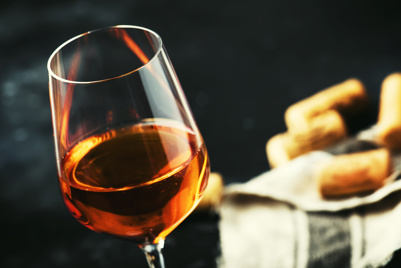What is orange wine?
Orange wine is popping up on wine lists all over the place, but what exactly is it?
 Let's talk skin contact
Let's talk skin contact
Put simply, orange wine is a white wine, which has had more contact with the grape skins during the winemaking process. Otherwise known as extended 'maceration', or simply 'skin contact', the interaction that the wine has with the grape skins gives it an orange-y colour, and a grippy tannic structure and phenolics (that provide colour and flavour) that you wouldn't find in your average white wines.
Typical tasting notes for orange wine include 'bold', 'honeyed', 'sour', 'bruised apple', 'nutty' and 'dried citrus peel'. Intrigued...?
The popularity of this quirky category has spread like wildfire amongst the New York and London bar and restaurant scenes, so much so that it's practically become mainstream in many circles. But one thing is notable, and that's its ability to divide opinion. With some professing it to be rancid, oxidative and undrinkable, others are quickly converted into hardcore fanatics.
Who started it?
Originating in Georgia, this style of white wine production dates back to the ancient tradition of ageing white wines in contact with their skins in giant, buried terracotta amphora. Whilst some producers still follow this traditional process, the term 'orange wine' has been extended to include any wines produced with extended skin contact, even those made in more commercial and anaerobic methods.
The conundrum of orange wine
The problem with the revival of orange wine is that it throws up a lot of questions.
For example, where should it sit on a list? Is it best with the rosés? The whites? Or should it sit in a section of its own?
Next lies the matter of service. For instance, what glassware is best? Should it be chilled like a white, or room temperature like a red? Does it pair well with food, and if so, which dishes work best?
Senior Wine Educator Emily Humphreys explains the minefield this can be. "It's really confusing for staff, and there's not a lot of understanding of what orange wine actually is. In fact, sometimes the customers will know more than the staff, because they often have an avid interest in orange wine."
"There are so many different styles too, so if we're talking about something that's more highly extracted and more tannic, then these are often better with food. But some styles are much lighter, and a lot of foods might overpower them, so you need to be careful. It's the same balancing act with service temperatures and glassware too."
 For hipsters only?
For hipsters only?
Whilst it's true that a lot of people believe these wines are only drunk by hipsters, the category is expanding and gradually producing a greater variety of styles that have a much wider appeal. In a recent training session, both the Domaine Lafage Taronja de Gris from Southern France and the Litmus Orange Bacchus wine from England went down a storm, uniting wine, cider and beer lovers alike.
It seems that even though tannin can be a component in wine that isn't enjoyed by everyone, it's this chewy texture that seemed to be a main part of the appeal for orange wines, making them more intriguing to the drinker and a novel change from more popular, mainstream styles.
What I would say is that there is a huge diversity of styles within the orange wine category, just like there is within the categories of white, red and rosé. We believe there's most likely an orange wine out there for everyone, so our best advice is to keep trying different versions, until you find the style for you!




